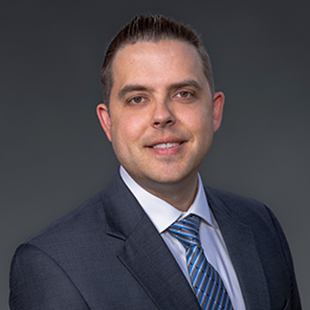In This Section

Robert Kurtz
Vice President, Field Exam Supervisor, PNC Business Credit
Robert Kurtz joined PNC Business Credit in 2014 as a field exam analyst within the Corporate and Institutional Banking Development Program. His progression included a stint within the Underwriting department, before returning to Field Exam as a supervisor in 2018. In this role, Robert leads field exam teams on some of the most complex exams in the portfolio, while also taking an active and integral role in the training and development of junior field examiners.
Prior to joining PNCBC, Robert earned a bachelor’s degree from the University of Southern California, Marshall School of Business. This followed five years in the United States Marine Corps, where Robert served as a Helicopter Mechanic. During his time in the Marines, Robert completed three tours of duty, including serving as a Shift Supervisor for 35 individuals, who supported daily flight operations, and as a Collateral Duty Inspector, who executed and inspected maintenance actions in accordance with established standards. During his free time, Robert enjoys the outdoors, and will be found hiking or cycling on most weekends.
How do you define a good leader?
A good leader is one who is passionate about developing individuals’ skillsets, helps them to progress in their career, and inspires creativity to think outside the norm. In my experience, great leaders always set clear expectations while providing the necessary tools to meet and exceed set goals. This is all done enthusiastically, while maintaining the upmost integrity.
What advice do you normally give to the junior talent you mentor?
One piece of advice I give to all early-career individuals is to never stop asking questions, with the caveat of showing you’ve put some thought into the question before you ask it. I ask them what their thoughts are on the matter and request they propose a solution. This method fosters deeper conversations and allows the individual asking questions to be a collaborative partner in the process. I also recommend that they keep asking questions if they don’t fully understand the response. It’s perfectly acceptable to ask for further clarity. Finally, I like to advise people to embrace what they don’t know and utilize the vast number of available resources to conquer the unknown. None of us know everything, however, if the right question is asked, an answer will be found.
What is the best professional advice you have been given and how have you implemented it?
Fortunately, I have had many great managers who have provided invaluable career advice. The top three include: never stop learning; hard work always pays off; and own your mistakes. First, the world we live in is always changing, requiring us to constantly adapt to new challenges. Continued learning can polish old skills or create new ones. Learning can be originated from anywhere, be it an early career team member, academia, or while conversing with others outside your field of practice. Another piece of advice, hard work always pays off. It may appear underappreciated at times; however, someone is always watching. Hard work and the continual drive to never stop learning work in tandem, which will ultimately lead to career progression and recognition. Finally, when mistakes happen, take complete ownership of them. This demonstrates to others you’re aware of the matter, and in a position to learn from it. Owning your mistake shows others your vulnerability in not being perfect and can foster greater confidence in team members, including trainees or mentees.
What advice would you give on how to self-advocate?
Self-advocating can be extremely difficult as it does not come natural for many. Start off by building a strong reputation for being a team player. Communicate your desire to gain new skills and enhance your value to the team by requesting special projects or tougher assignments. Tackle every obstacle with a positive attitude. Become an approachable individual people want to work alongside. While you are building your reputation, spend time widening your network in varying fields of interest. Practice promoting yourself to friends and peers, requesting detailed feedback. Finally, effectively communicate your strengths and ambitions to management. Be concise and provide relevant examples for the opportunity presented. And remember, always show appreciation for those who have helped you along the way.
Professional Development Courses
- Live online classes for ABL and Factoring professionals
- On Demand classes in Appraisals, Factoring, Legal, Workout & Bankruptcy
